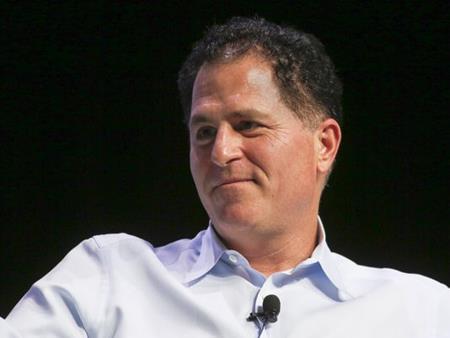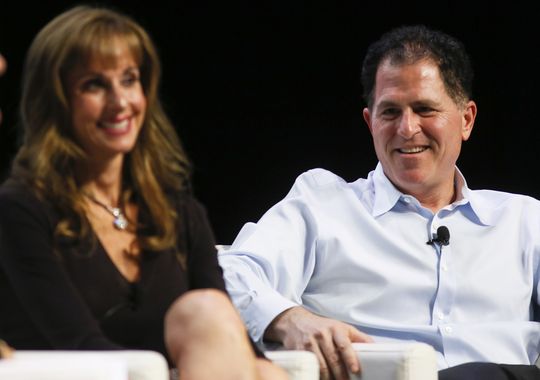|
Michael Dell beat Icahn, now he's reinventing PC stalwart
|

Michael Dell at the fifth annual Dell Women's Entrepreneur
Network meeting in Austin. (Photo: Jack
Plunkett, AP for Dell) |
|
AUSTIN – Michael Dell was in a jocular,
feisty mood – and who could blame him?
It had been several months since he'd
wrested control of the company he founded 30 years ago in his college
dorm from a ferocious corporate raider. And the buoyant Dell just
received word his iconic company was expecting its sixth straight
quarter of growth in PC market share.
"I won. It's over," the normally low-key
Dell said in a rare, extensive interview here last week. "I feel
liberated and unleashed. There is an infectious feeling with winning."
As victories go, this one was historic
and gut wrenching. Dell took his company private in a $25
billion deal last October after a bruising, year-long battle with
activist investor Carl Icahn. The showdown was essential to the
survival of the company, Dell insists, after it embarked on a
shape-shifting mission to diversify into data centers, cloud
computing, servers, software, services, security and system
management.
The PC laid the foundation for all of
it, Dell said.
Now comes the hard part, some analysts
suggest: reinventing a company that made its name — and fortune —
selling personal computers in a world increasingly beholden to
smartphones and tablets.
It is a challenge Dell relishes after
feeling handcuffed by the expectations from the market for a public
company undergoing a significant makeover. "The market encourages
(public companies) to not make investments in new areas," he says,
wincing at the notion. "It is short-term focused."
Dell reflected on his company, the PC
industry and all things tech in a 45-minute interview from a
conference room backstage at Austin City Limits, the legendary
TV music program. Shortly afterward, he and wife Susan appeared
onstage for the first time together to discuss their philanthropic
foundation, which is separate from Dell the company.
Dell can look back on the
multibillion-dollar showdown with Icahn and chuckle – sort of. "I can
do whatever I want," he says, laughing. "I'm the boss." (Icahn did not
return phone and e-mail messages Monday.)
The post-privatization plan
It's been five years since Dell
audaciously pursued an enterprise strategy. It acquired executives –
such as Computer Associates CEO John Swainson and Marius Haas, a
former Hewlett Packard exec – and it snapped up more than two dozen
companies, including Wyse Technology and SonicWALL. It also stepped up
investments in research and development, through its Dell Research
Division and Dell Ventures.
The Round Rock, Texas-based Dell also
intends to capitalize on the ubiquitous Internet of Things,
sensor-enabled devices and wearable devices that are expected to
number in the tens of billions within a few years. "It's an exciting
opportunity," says Dell, 49. "Anything that creates more nodes and
data means potentially selling more servers, storage and networking
gear."
But the company is drawing the line at
building its own line of wearable devices, he says.
"The world got enamored with smartphones
and tablets," Dell says. "But what's interesting is those devices
don't do everything that needs to be done. Three-D printing,
virtual-reality computing, robotics are all controlled by PCs.
Productivity is grounded in the PC."
"Where does the computing power come
from?" Dell says, leaning forward. "How would you run USA TODAY
without PCs? Run a hospital without PCs?"
"People don't want products, they want
solutions," Dell says.
Since completing its deal to go private,
Dell has signed partnerships with Dropbox, Microsoft and Google to
work on cloud computing. In December, it announced it was creating a
$300 million venture capital fund. (On May 29, Dell CFO Tom Sweet said
the company paid down $1 billion of its leveraged debt since going
private.)
A private Dell allows it to move at its
own speed to transform to an end-to-end technology solutions company
without quarterly pressures from Wall Street and comparisons to rivals
HP, Lenovo and Microsoft, says IDC analyst Matthew Eastwood, who
closely follows Dell.
The rub, however, is selling the
company's broader product lineup and services to longtime customers
weaned on Dell PCs and servers, Eastwood says.
"That takes both deeper and different
relationships with customers," he says. "Many of Dell's sales
professionals will not be able to effectively make this transition."
The new Dell also "needs to work much
harder to get its message out and change customer perceptions
regarding its capabilities as an enterprise-solutions provider,"
Eastwood says. "This will take additional advertising and marketing
effort at the corporate level."
|

Michael and Susan Dell address the
fifth annual Dell Women's Entrepreneur Network meeting June 2 in
Austin. (Photo: Jack Plunkett, AP
Images for Dell) |
The shift won't be easy. While PC
revenue shrinks, Dell's enterprise-computing business has struggled to
gain ground after spending $13 billion on 20 acquisitions since 2009.
Competition in the field is vicious, with rivals including Cisco
Systems, HP and IBM.
Haas says he's trying to transform Dell
into a partner that businesses can count on for every technical aspect
of a project – not just a supplier to customers' procurement
departments. "Enterprise-class clients are realizing Dell is a
formidable player," says Haas, who points out Dell is first in server
market share in Asia Pacific and America and No. 2 in Europe. "In the
past, we were not in consideration."
Analyst Patrick Moorhead, an Austin
resident who speaks frequently to Michael Dell, is more blunt. Five
years ago, Dell was "nowhere with storage, networking and software
services," he says. "Through that lens, today it has achieved a lot."
A history of ups, downs
In the mid-1980s, Dell grasped the
potential for selling PCs directly to consumers when most personal
computers were sold via distributors and retailers. Though others like
Gateway and Zeos quickly followed, they eventually faded away. By
1992, Dell – then 27 – earned the distinction as the youngest CEO of a
Fortune 500 company.
"Thirty years ago, I made a decision to
leave school and pursue my dream. I didn't know the impact we'd have
on the world," the Dell founder wrote in a letter to employees in May.
"We innovated a better way to make, sell and support technology – and
the rest, as they say, is history."
For now, the ending appears happy. "What
I saw at Dell's analysts' meeting (in May) was a relaxed, confident
Michael Dell," Moorhead says. "He is no longer under the thumb of Wall
Street. He can make moves at his pace."
When Dell had enough shareholder votes
to fend off Icahn in mid-September, the company held a celebration.
Hordes of employees lined up early to
attend. And when Dell took the stage to address the troops, he was
showered with a 10-minute standing ovation, moving him to tears, says
Karen Quintos, Dell's chief marketing officer.
"It was my most memorable moment (in 14
years) here," Quintos says, choking up at the memory. "It was profound
moment, a realization of how iconic this company is and where it is
headed. Not many companies have chances" for a second act.
"We got our swagger back," Chief
Information Officer Adriana Karaboutis says.
|